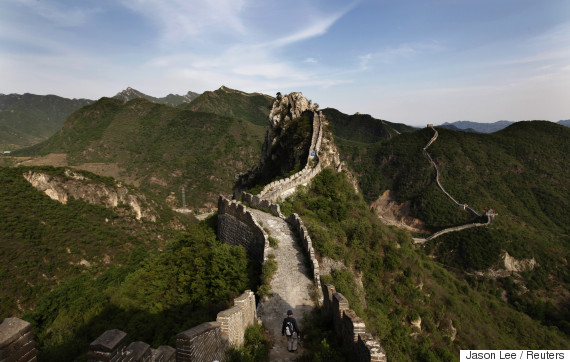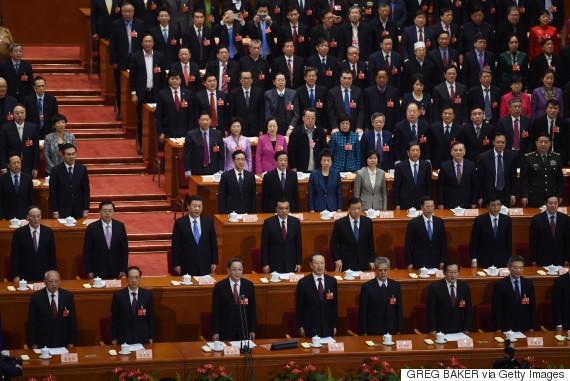
BEIJING -- Kate Merkel-Hess and Jeffrey Wasserstrom's thoughtful response to an essay on Chinese politics by WorldPost editor-in-chief Nathan Gardels reminds us of the need to take into account the rich and multifaceted political traditions in China.
From the Spring and Autumn period until the collapse of imperial rule, Chinese thinkers defended a diverse array of Confucian, Legalist, Daoist and Buddhist values, and since then they have also debated political traditions imported from the West, including Marxism, liberalism, anarchism and feminism. It's a mistake to say that there is only one political tradition in Chinese history and to draw implications for contemporary China based on that assumption. I don't think Gardels makes this mistake -- he refers to a "mainstream view" and allows for the possibility of counter-currents.
The problem, rather, is that Wasserstrom and Merkel-Hess go to the other extreme, identifying with those counter-currents and urging Western critics of China to criticize the Chinese government for failing to live up to the "best parts" of the Chinese tradition. And those parts just happen to coincide with "liberal democratic ideals and concepts of human rights" developed in Western societies. In other words, Western critics of China should use their own inherited political framework for evaluating political progress and regress in China and they should support "indigenous" Chinese critics who share their views.
It's a mistake to say that there is only one political tradition in Chinese history.
What's missing in the response by Merkel-Hess and Wasserstrom is any acknowledgment that there may be morally legitimate and politically realistic alternatives to liberal democracy when thinking about how to evaluate political developments in China. In this sense, their mindset is no different than Western colonialists who sought to promote their political beliefs in China throughout the 19th and 20th centuries, with mostly disastrous effects in China itself. Still, their essay raises two important issues. First, which political traditions or values matter for the purpose of explaining contemporary Chinese politics? And second, which political traditions or values matter for the purpose of evaluating contemporary Chinese politics? Let me address each of these questions in turn. If the aim is to explain political institutions and policy outcomes, the effects of economic and political factors often seem more immediate and less controversial. But culture can also play an important role: it provides an intellectual framework for sociopolitical alternatives and the motivational resources for policy implementation, and certain paths thus become more likely.

Consider the value of political unity discussed by Gardels. As historian Yuri Pines shows in his excellent book, "The Everlasting Empire," political thinkers of the Warring States period, whatever their differences, agreed on the principle of unification under a single monarch, and this principle became the basis of Chinese political thought. The principle of political unity helps to explain the origin of institutional arrangements: the development of imperial China and the source of imperial authority. It also helps to explain the stability of policies and institutional arrangements: Pines argues that the Chinese empire, despite periods of disorder and disintegration, was regularly restored with fundamental institutional, sociopolitical and cultural features similar to that of the pre-turmoil period. And the principle of political unity helps to explain the failure of ideas and policies to take root: 20th-century Chinese supporters of provincial independence never got very far because their ideas were so fundamentally at odds with leading political values. In short, deeply held mainstream political values provide the motivational resources to influence certain outcomes, both in the minds of legislators and in the minds of people who must follow (or defy) their decisions. The Chinese Communist Party, as Pines notes, can be seen as the latest manifestation of the unitary state and imperial authority, but with trained and experienced leaders bound by term limits rather than a hereditary leader at the top. In the same vein, Gardels suggests that the deeply held idea of the unitary state influences the policies of current leaders and helps to explain why those policies are generally well received by the people. Of course, it is theoretically possible that counter-currents such as American-style ideas of adversarial politics and strict divisions of power can became popular and eventually displace mainstream ideas. In the absence of strong evidence, however, such proposals seem like wishful thinking. The idea of political meritocracy may be just as deeply rooted in Chinese political culture as the idea of political unity: from Confucius onwards, most Chinese thinkers accepted the premise that the political system should aim to select and promote public officials with superior ability and virtue, and they argued mainly over which abilities and virtues matter and the best ways of assessing those qualities. Starting from the Sui dynasty, imperial China institutionalized political meritocracy by means of the imperial examination system, and successful examination takers were usually promoted based on performance evaluations at lower levels of government.
There need to be mechanisms in place to filter out Chinese-style Donald Trumps from getting near the top of the political hierarchy.
Like the idea of political unity, the idea and practice of political meritocracy came under fundamental attack in the 20th century. But the country was primed for the revival of political meritocracy following a disastrous experience with radical populism and arbitrary dictatorship during the Cultural Revolution, and China's leaders could reestablish elements of its meritocratic tradition that is almost identical in form (but not content) to the meritocratic system for the selection and promotion of leaders in imperial China. Whatever the political reality and the prospects of political change, however, liberal democrats may still argue against "the supposedly 'meritocratic' governance system of the People's Republic of China," as Merkel-Hess and Wasserstrom put it, and for the benefits of electoral democracy as a method to select political leaders. One would be hard pressed to find defenders of family-based dictatorship outside of North Korea even if the system happens to be stable and rooted in history. So why should we think "autocratic" rule in China belongs in a different moral category? But is political meritocracy really so bad? I've provided a full defense in my book "The China Model," and let me summarize the arguments here. First, the fact that political meritocracy has deep roots in China means it will likely be relatively stable in a Chinese context compared to political alternatives, including electoral democracy. Second, political surveys show consistent support for political meritocracy in China. Third, a large country with responsibilities for future generations and the rest of the world needs to select and promote experienced and informed leaders who should not simply be held accountable to the current generation of citizens. Fourth, rapid technological innovations and sudden financial shocks and natural disasters may require effective responses by relatively unconstrained leaders with a proven record of sound political judgment. And lastly, political meritocracy is compatible with basic human rights and a wide array of democratic values and practices, including electoral democracy at lower levels of government and various mechanisms for improved consultation, transparency, participation and deliberation.

Perhaps I've been unfair to Merkel-Hess and Wasserstrom. I've long admired their erudite yet accessible works on modern Chinese history, and maybe their normative commitments have been changed by encounters with Chinese thinkers. If that's the case, I'd like to learn precisely how the normative standards they use to assess progress and regress in Chinese politics differ from the ones used to assess progress and regress in American politics.
Also on WorldPost:

